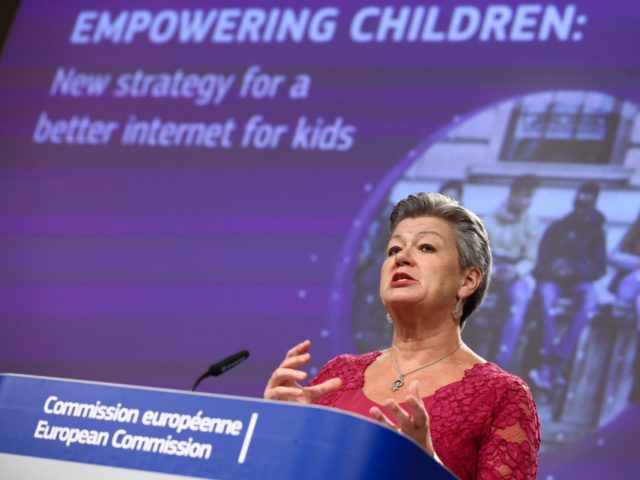Critics have slammed a new European Commission plan to monitor private communications online in the name of protecting children from abuse, stating the move amounts to the mass surveillance of Europeans.
The European Commission’s “Better Internet for Kids” plan was announced on Wednesday and looks to oblige internet service providers (ISPs) to detect, report and remove illegal materials depicting child sexual abuse as well as actively monitor private messaging, including encrypted messages.
While many companies, such as Apple, have long refused to allow government access to their encryption services, the Commission has argued, “if such services were to be exempt from requirements to protect children and to take action against the circulation of child sexual abuse images and videos via their services, the consequences would be severe for children,” Euronews reports.
Another big tech clampdown on free speech online appears to be forthcoming after the European Union agreed in principle more online censorship laws on Saturday. https://t.co/7kawZWAIN9
— Breitbart News (@BreitbartNews) April 24, 2022
The project will be run through a new EU Centre on Child Abuse, which will enforce the measures as EU commissioner for home affairs Ylva Johansson told a press conference Wednesday, “We are failing to protect children today.”
While the proposals to automatically read Europeans’ encrypted private messages are being sold as essential to protect children, some are worried the potential for the powers to be abused go well beyond that. Tom J.P. Vandendriessche, a member of the European Parliament (MEP) from the Eurosceptic, right-wing Belgian party Vlaams Belang, slammed the Commission’s proposal telling Breitbart London, “Chat control is a breach of several fundamental rights. Not only the right to free expression, but also the right to privacy. Yet another example of how the EU commission is trying to spy on citizens, suppress civil rights and disenfranchise ordinary citizens. ”
“Totalitarian tools and their love of mass surveillance are spreading throughout the European institutions like a virus. It is in fact a China Virus 2.0. Deadly for our freedom and democracy,” he added.
Germany Busts ‘One of the World’s Biggest’ Child Abuse Websites https://t.co/HHScvWrODV
— Breitbart London (@BreitbartLondon) May 3, 2021
Privacy experts have been just as critical of the proposal, including Jan Penfrat of digital advocacy group European Digital Rights (EDRi), who said, “This looks like a shameful general surveillance law entirely unfitting for any free democracy.”
The proposal would see the EU issue “detection orders” to services like Whatsapp, Signal, Facebook Messenger and others which would require the companies to scan private messages of users for abusive content and messages that my be considered to be sexual or to be going toward the grooming of children.
However, according to Ella Jakubowska, an advisor to EDRi, it is not clear if the detection orders would need to be targetted, saying, “It completely leaves the door open for much more generalized surveillance.”
Joe Mullin, a senior policy analyst at the Electronic Frontier Foundation, was also critical, saying, “There’s no way to do what the EU proposal seeks to do, other than for governments to read and scan user messages on a massive scale.”
“If it becomes law, the proposal would be a disaster for user privacy not just in the EU but throughout the world,” he added.
The European Union, along with several member states within it, have long made attempts to regulate speech on the internet, particularly hate speech and social media companies have been threatened with hefty fines for not removing illegal content in the past.
Spanish Conservatives Propose Ending Anonymity Online https://t.co/rP5tM2wE43
— Breitbart London (@BreitbartLondon) October 20, 2021

COMMENTS
Please let us know if you're having issues with commenting.